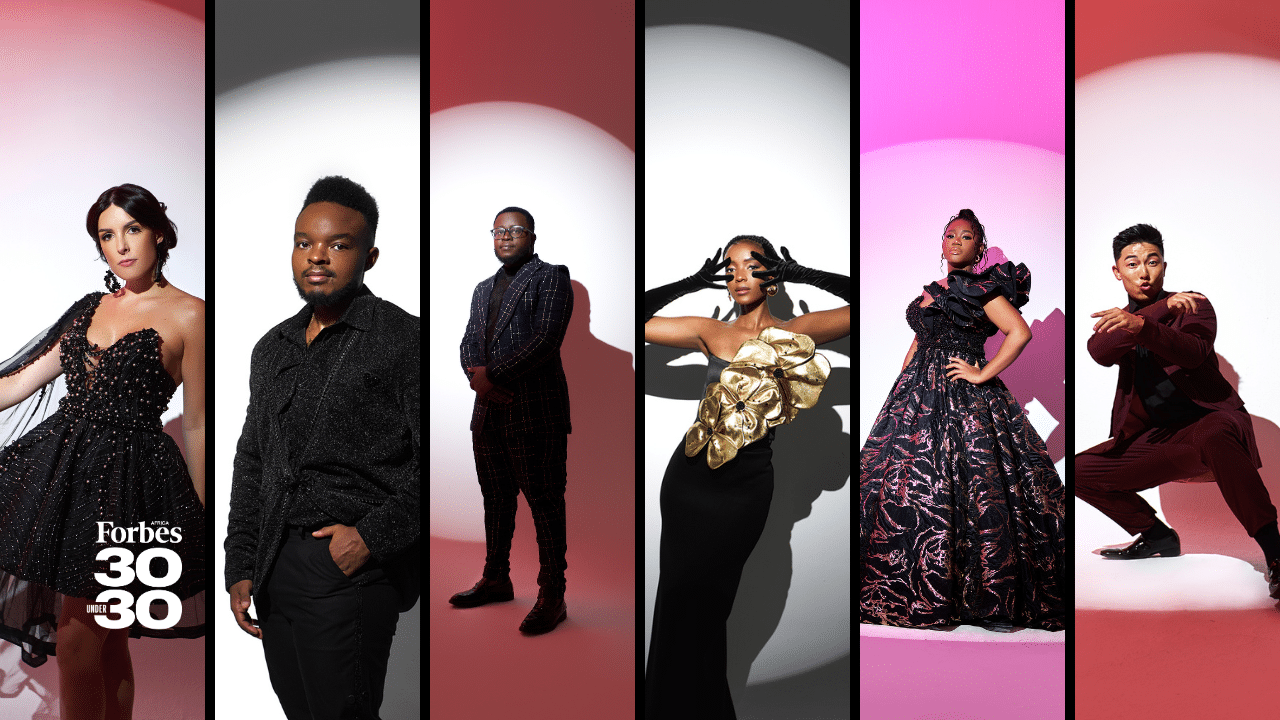The milestone speaks for itself: it’s the 10th anniversary of FORBES AFRICA’S 30 under 30 list, and just like the honorees who have come before them, the class of 2024 too are driven by impact. Profits aside, it’s about achieving success with innovation, influence and individuality. They aren’t looking to fill big shoes but rather lace up their own and forge ahead with giant strides, leading by example and leaving an indelible path for the changemakers to come.
Words and Curation: Chanel Retief
Additional research and reporting: Nicole Pillay With inputs from: Oluwatomisin Amokeoja
Art Direction and Layout: Lucy Nkosi | Photography: Katlego Mokubyane | Photography Assistant: Sbusiso Sigidi | Studio: NewKatz Studio, Johannesburg | Styling: Deneal Van Wyk | Outfits supplied by: B Mashilo Designs, DFLO, Franc Elis, Ephymol and Preview Accessories | Hair & Makeup: SnehhOnline Beauty
TEN YEARS, of uncovering some of the most influential and iconic young people on the continent. Ten years, of shining the spotlight on business innovators and tech trailblazers impacting their communities, countries and the continent.
Ten years, of profiling record-breakers, history-makers and risk-takers determined to rewrite the narrative on Africa. The 10th anniversary of FORBES AFRICA’s 30 Under 30 list is testament to the unmistakable potential and talent pool that exists on a continent boasting the world’s youngest population, and their role in together crafting Africa’s growth story.
Building a business and a brand, and consistently creating change on the continent, as a 20-something, is no mean feat. And it’s perhaps their path-breaking innovations and against-all-odds resilience that’s leading the rest of the world to Africa as the next frontier. The world is becoming more African. The whole continent of Africa, with 54 countries, is home to 1.45 billion people, and the economies are being driven by a growing young population.
Loading...
The United Nations states in a report that 70% of sub-Saharan Africa is under the age of 30; and that more than a third of the world’s young people will live in Africa by 2050.Experts also stipulate that the future of Africa’s wealth is young and female, and they hold the greatest potential for investment prospects.
The 2023 Africa Wealth Report, published by Henley & Partners in partnership with New World Wealth, reports that the total investable wealth currently held on the African continent amounts to $2.4 trillion, and its millionaire population is expected to rise by 42% over the next 10 years.
Whatever the numbers, over the last decade, we have recorded this and more of Africa’s appetite and tireless tenacity for growth and prosperity, with the youth spearheading that narrative, never veering away from the heartwarming concept of ubuntu (compassion and humanity) bringing the continent and its communities together. We can’t wait to see what the next decade will unfold.
Editor’s note: The list follows no particular order
METHODOLOGY
The nomination process began late 2023, as over a thousand applications came through. Part of the rigorous reporting and vetting process also involved going through social media profiles, police clearance reports, reference letters from financial institutions and testimonials from the colleagues, collaborators, business partners and employees of short-listed nominees. Background checks were conducted on potential candidates, which included reviewing documentation to ensure there are no criminal records, troubling lawsuits/bankruptcies, and/or allegations of crime, misconduct, sexual harassment/abuse or fraud. For the 2024 list, FORBES AFRICA, for the fifth year running, partnered with audit fi rm SNG Grant Thornton to assess company financials from losses to growth margins to overall revenue and profits since incorporation. In addition to the research and reporting of the editorial team, FORBES AFRICA also depended on a panel of high-profile judges and independent subject-matter experts to ensure that only Africa’s most merit-worthy make it to the final list. Instead of having only one adjudicator per category (Business, Technology, Health/Science, Creatives and Sports), we also sought the help of past list-makers – our illustrious 30 Under 30 alumni – to judge potential finalists. This list is only but a small indication of the wealth of young talent that exists on the continent and they will no doubt be unraveled on these pages in the months and years to come.
EXTERNAL JUDGES: THE CATEGORY EXPERTS WHO TOOK ON THE ROLE OF SURVEYING ALL THE FINALISTS OF THE 2024 30 UNDER 30 LIST AND PROVIDE COMMENTARY ON EACH CANDIDATE:
Business/Technology
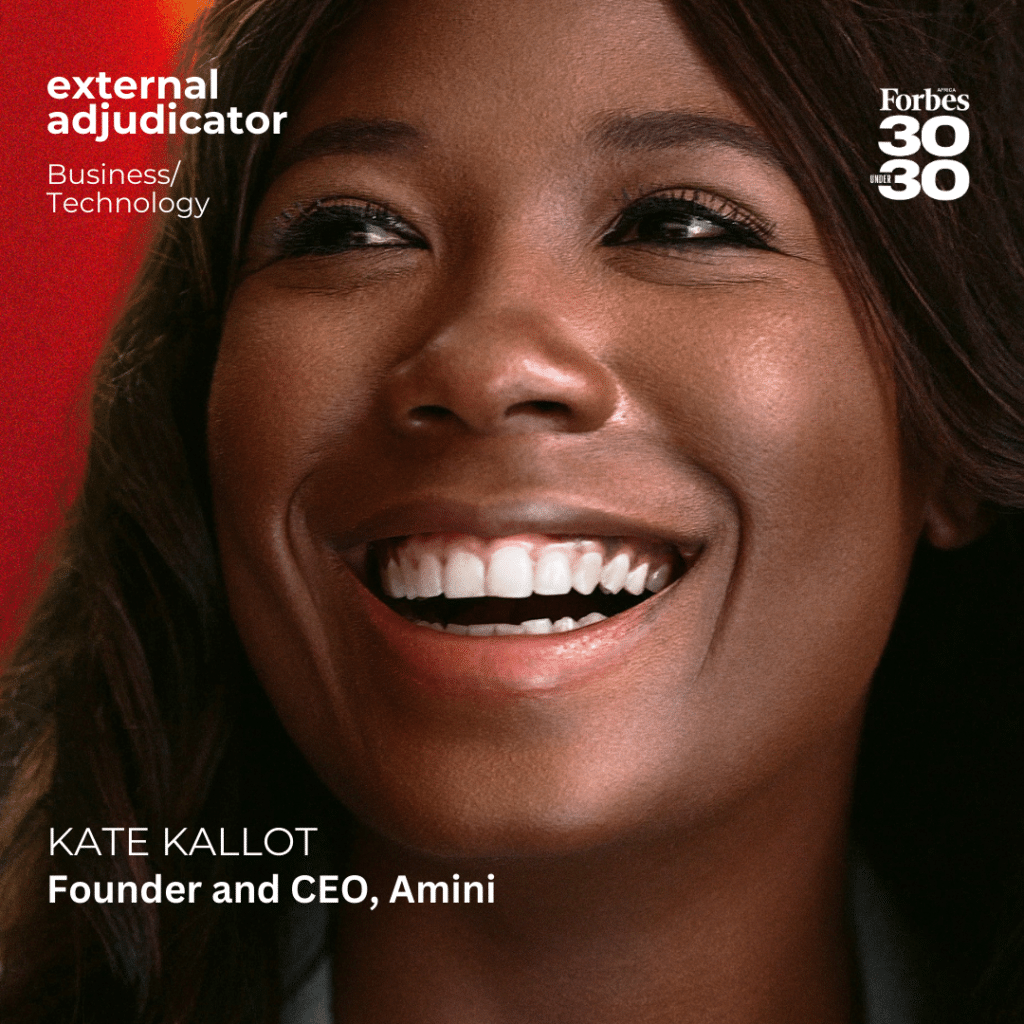
Kallot has received global acclaim for her work advancing technology access across Africa. She has received multiple accolades, including being named one of TIME 100’s Most Infl uential People in AI. With over a decade of experience leading AI innovation at global tech companies such as Nvidia, Intel and Arm, she has a proven track-record of delivering cutting-edge technology solutions that drive social impact and transform communities.
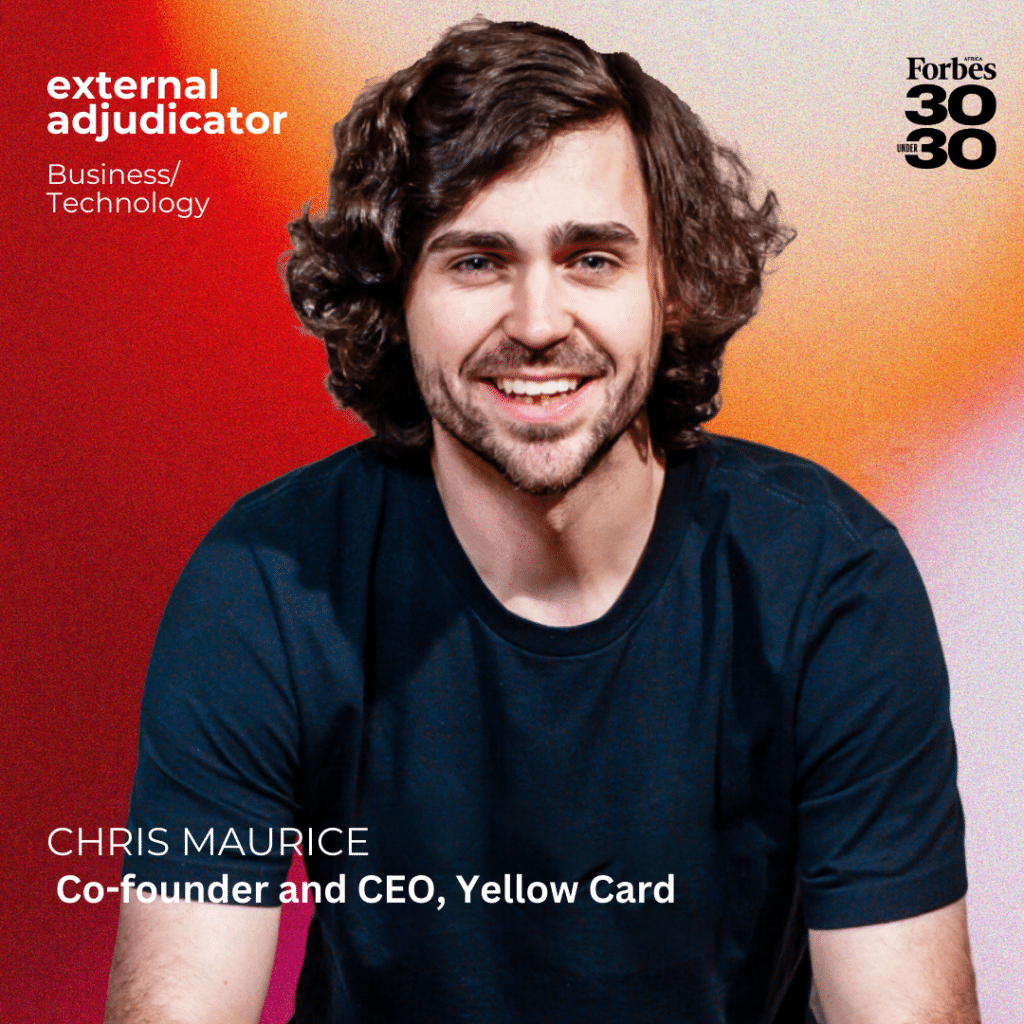
Maurice is a 27-year-old American tech entrepreneur who has spent fi ve years living and working in Africa, making signifi cant contributions to the continent’s fi nancial services industry. Yellow Card is the largest centralized crypto exchange on the continent, has facilitated over $2 billion in transactions, grown to over 200 employees across 25 countries, and launched full on-and-o ramps for local fi at currencies in 20 African markets.
Health and Science
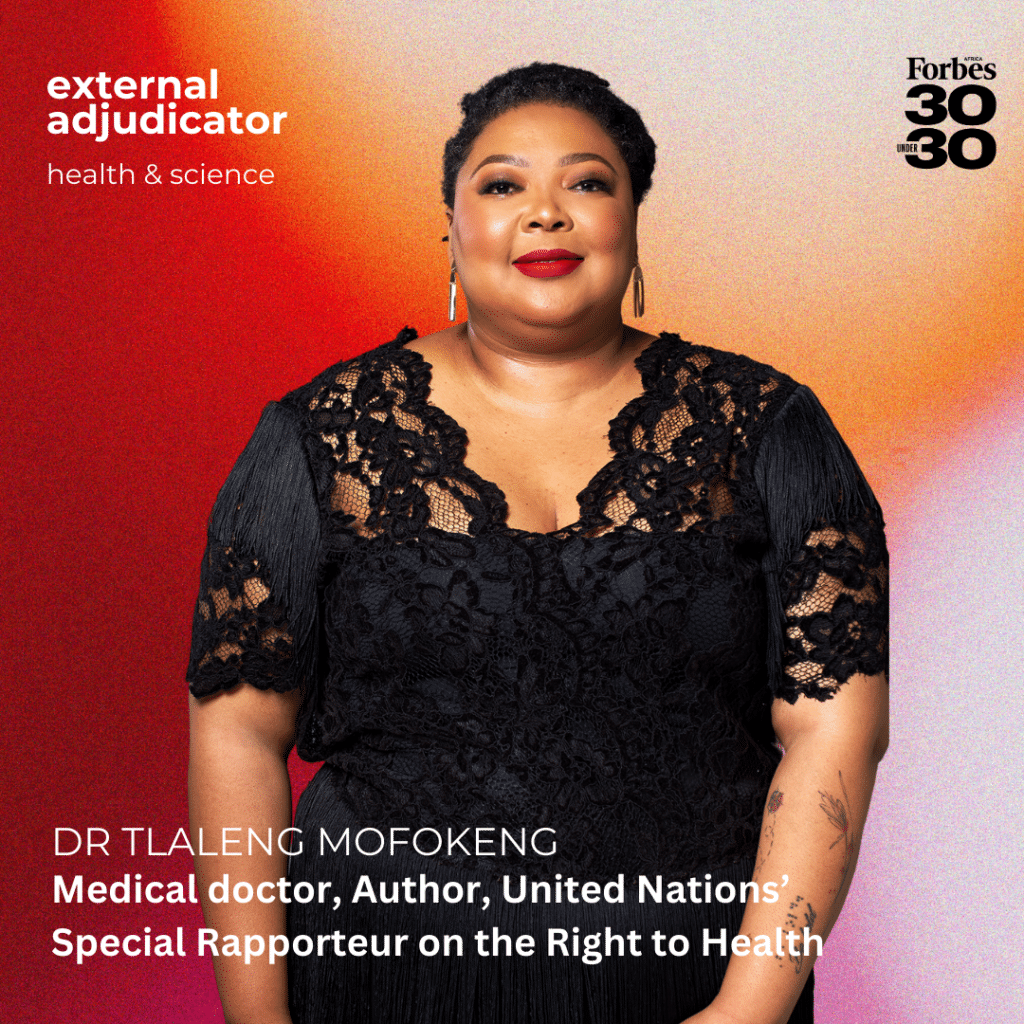
Mofokeng is the United Nations Special Rapporteur on the right of everyone to enjoy the highest attainable standards of physical and mental health, and a medical doctor at DISA Clinic in Johannesburg. She is also the author of Dr T: A Guide to Sexual Health and Pleasure, a broadcaster, a senior lecturer of Gender, Culture and HIV at the Africa Centre for HIV/AIDS Management, Stellenbosch University, and lecturer at the O’Neill Institute, Georgetown University in the U.S.
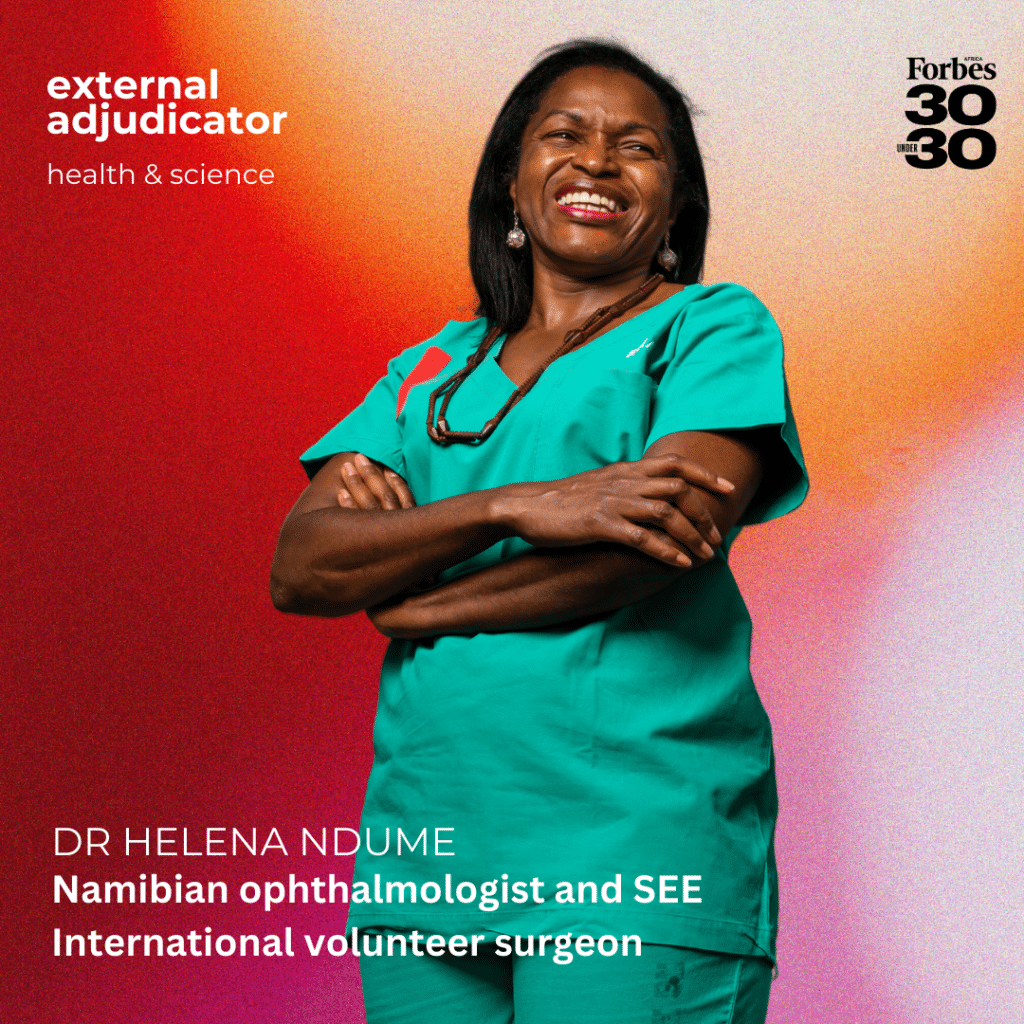
Ndume is internationally-renowned for her humanitarian work. To date, she has performed sight-restoring surgeries for over 35,000 Namibians, free of charge. Through partnerships, she organizes a minimum of fi ve eye camps annually, which benefi t an estimated 1,000 persons ranging in age from four years to 90+. Ndume has dedicated her career to treating blindness and low-vision, both in Namibia and throughout the developing world. Since 2005, she has served as the Head of Ophthalmology at Windhoek Hospital, and has received prestigious awards.
Creative
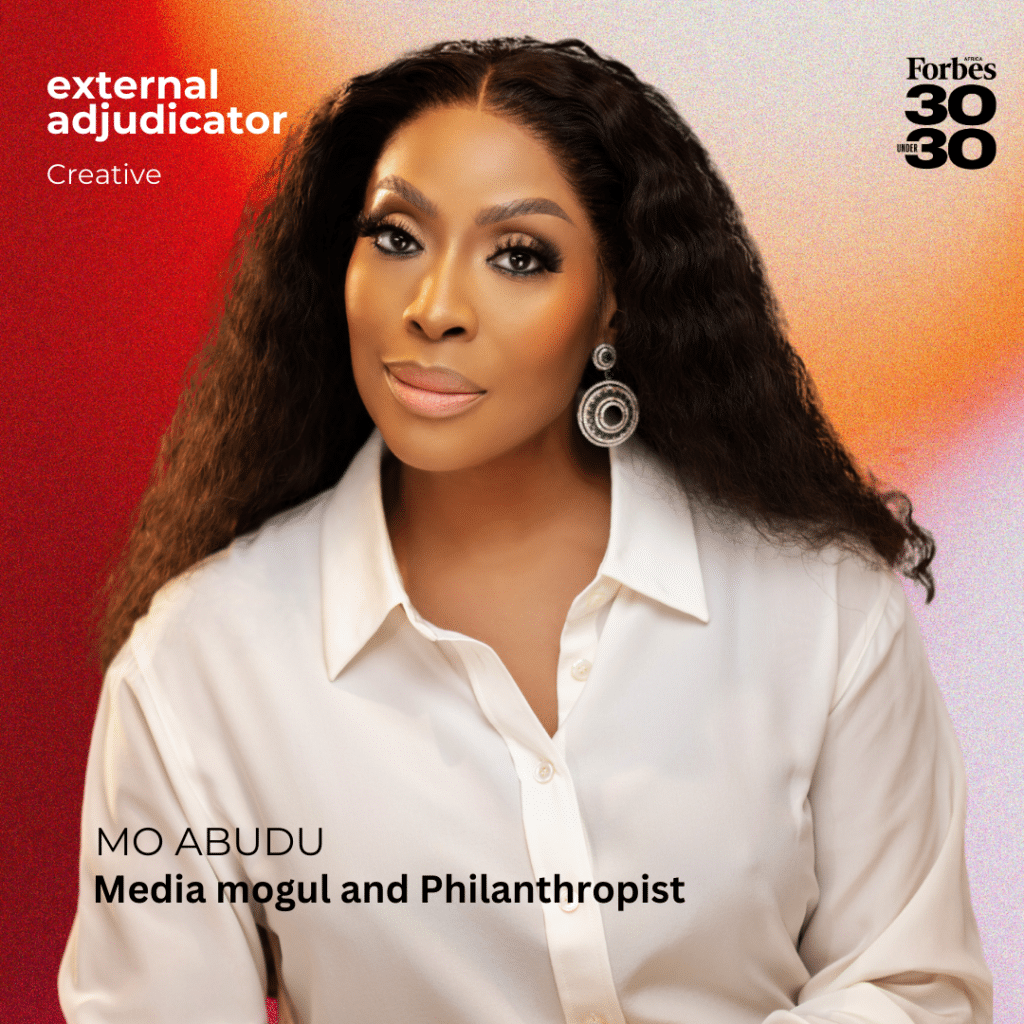
Forbes has called Abudu one of the world’s most powerful women. She oversees EbonyLife Media, comprising EbonyLife Films and EbonyLife Studios, as well as the EbonyLife Creative Academy, a school aimed at accelerating fi lmmaking skills, and EbonyLife Place, Nigeria’s fi rst luxury entertainment resort. She has produced several high-grossing blockbusters including Fifty, The Wedding Party, Your Excellency and Òlòturé. Abudu’s recent success is the launch of Blood Sisters, Netfl ix’s fi rst original Nigerian series. The show made the Netfl ix Global Top Ten list with over 11 million hours viewed.
Sport

Having been associated with the national football team on and off for 30 years, Ellis made her mark as a national representative for Banyana Banyana from 1993 to 2002. She took the experience of 32 caps, including captaincy when South Africa won the 2002 COSAFA Women’s Championship, and successfully transitioned to coaching internationally. After an initial two years as interim coach, she rose to head coach in 2018 and has since built an outstanding résumé. The high points came in 2022 and 2023 when she coached Banyana Banyana to the Women’s Africa Cup of Nations title, which also earned qualifi cation for the 2023 FIFA Women’s World Cup and led them through to the Round of 16. The Confederation of African Football awarded her Women’s Coach of the Year honors in 2018, 2019, 2022 and 2023.
Alex Mativo 29, Kenya
CEO and Co-founder, E-LAB, Nanasi and Duck
Industry: Multiple ventures
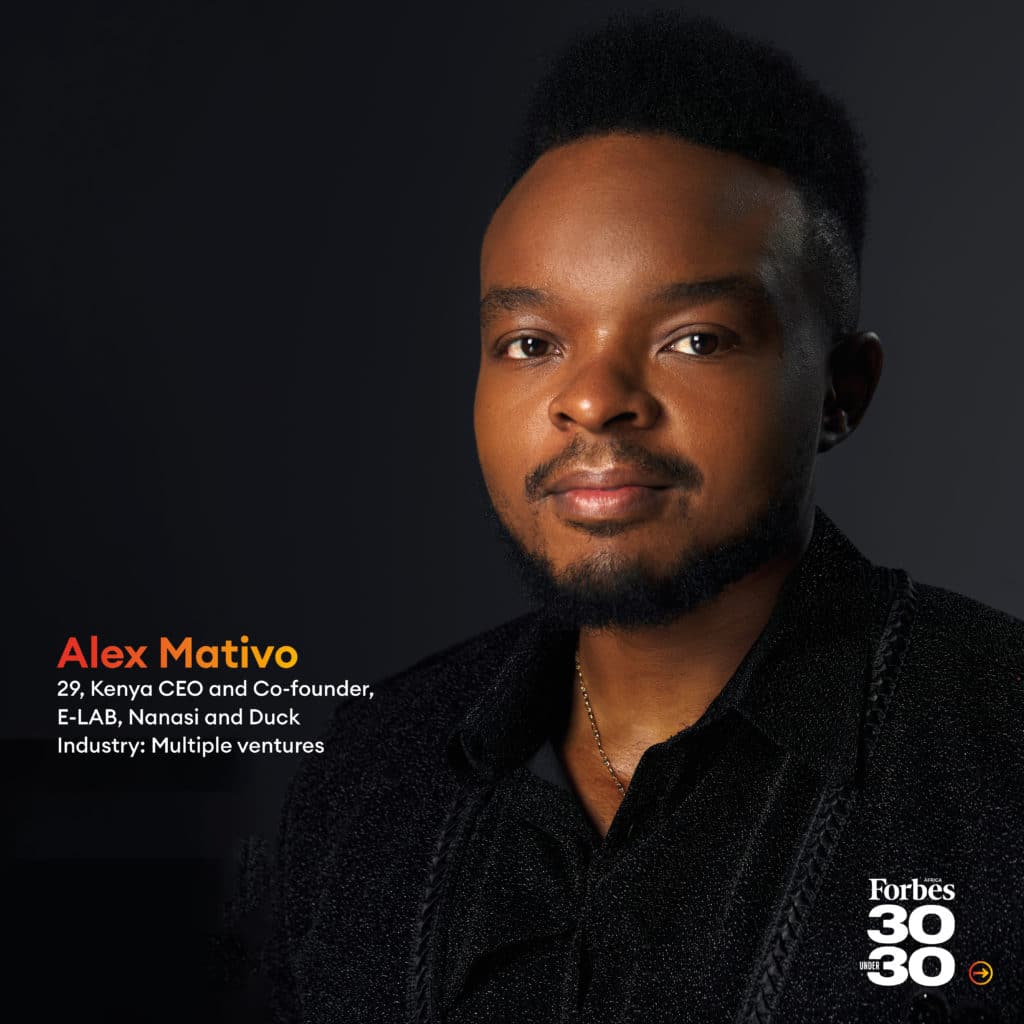
From East Africa’s largest economy to England, Alex Mativo dared to dream. In 2014, at just 19 years old, he founded E-LAB, a startup aimed at eradicating electronic waste in Africa and transforming it into products used in the fashion and interior design industries.
Advertisement
For Mativo, it wasn’t just about eliminating 4,000 tons of waste from Africa’s communities but also creating thousands of jobs for artisans in the process.
The late Queen Elizabeth II celebrated Mativo for his work with E-LAB, presenting him with one of the Queen’s Young Leader Awards in 2016.
“Starting E-LAB at 19 without capital and business experience was my most challenging endeavor,” Mativo tells FORBES AFRICA.
“While my peers were joining university, I was fighting an environmental hazard in my hometown of Athi River (a town outside Nairobi). Electronic waste was unregulated, which led to factories discarding mountains of e-waste in my backyard.”
His innovative nature didn’t stop there.Mativo’s latest venture, Duck, is a natural evolution of another one of his businesses – Nanasi, an operating system that helps restaurants seamlessly manage online and offline orders, payments, and operations. Duck expands its reach by tackling a notable challenge: data scarcity in Africa’s vast informal retail sector.
“As a FORBES AFRICA 30 Under 30 honoree, I would gain a platform to amplify my message and inspire the next wave of changemakers to build ventures that solve real African problems,” Mativo adds.
As a judge of the Business and Technology categories of the 30 Under 30 list, Amini founder Kate Kallot comments on him: “[Alex is] showing quite a lot of resilience, which is the single-most important attribute in business.”

In February this year, Tyla Laura Seethal’s life changed forever when she won her first Grammy, simultaneously becoming the youngest African artist to win the golden gramophone. “I never thought I’d say I won a Grammy at 22 years old,” the South African singer said after taking home the Best African Music Performance award for her single, Water.
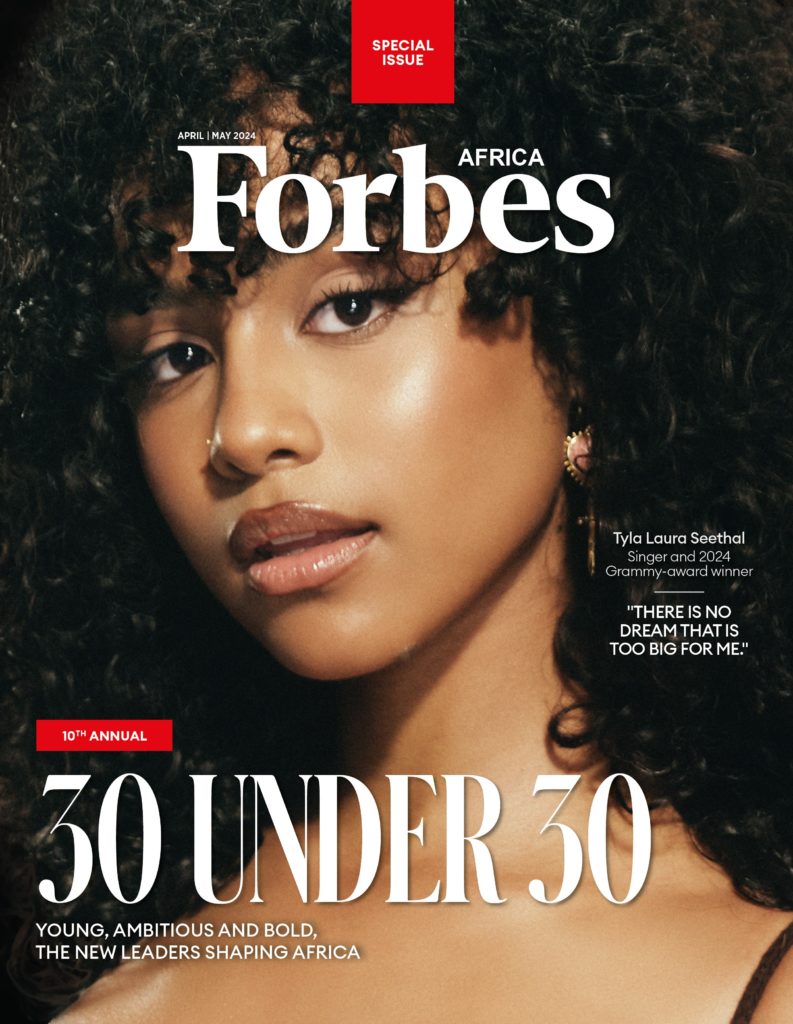
“I can’t even explain the feeling I had,” Seethal tells FORBES AFRICA. “Leading up to that moment and that day, me getting ready and everything… I was still nervous and unsure how that night was going to go.” It was a proud moment not only for her but for South Africa and the African continent as she became the first recipient of the award.
“Being the first person…” Seethal gushes. “It was such a big moment!”Utilizing the power of social media while still in high school, Seethal gained traction by posting song covers for her followers on various platforms. The Johannesburg-born singer was then discovered, leading to her national success as an artist.
“Tyla’s exceptional talent shines through,” Mo Abudu, judge of the Creative category for this list, says. “Her dedication to her craft and ability to captivate her audience is truly remarkable.”
When asked what’s next for the Grammy award-winning artist, with her first album, Tyla, released in March, she smiles: “Everyone knows that I am a dreamer. There is no dream that is too big for me. This is just the beginning. [There will be] more Grammys to come; more hit songs; more amazing things for Africa… there is no limit.”

Known to the world for his quips on social media and hilarity when celebrating wins, Willemse is also known as the youngest member to win two Rugby World Cups – winning with the team in 2019 and in 2023. According to the Stormers, at the 2023 World Cup in France, he was a fixture at fullback as the Springboks made it back-to-back wins. As one of the ‘kids with the hot step’ growing up in Strand, a town in South Africa’s Western Cape province, Willemse came from a sports-mad community and family. “The thing about Damian is that he is a great rugby player. You can play him on the wing, at center, or at fullback, and he will perform,” Stormers backline coach Dawie Snyman said during a media conference in 2022.

At the age of 21, Kenneth M. Njeru embarked on a journey driven by a passion for healthcare and a deep-seated commitment to making a meaningful impact in people’s lives. The initial start of Africa Afya Healthcare began with Njeru’s focus on healthcare mergers and the acquisition of healthcare facilities by attracting investor capital for worthwhile deals, but it later evolved to include cutting-edge IT solutions.
“Recognizing the immense potential of healthcare to create positive change, I made a pivotal decision. I had to choose between two dynamic industries: healthcare and information technology. Ultimately, I chose healthcare.
My vision was to capitalize on its promising fundamentals and leverage its capabilities for the greater good of society,” he says.Africa Afya Healthcare’s mission is to work with strategic partners to advance healthcare access in Africa. Currently, Njeru facilitates the acquisition of investments in healthcare facilities in Kenya.

“If someone had told me a decade ago that today I would have a successful psychology practice, be the founder of a ground-breaking mental health platform, and share my life with my husband and two mischievous dogs, I might have dismissed it as a fanciful tale,” Jorgensen says to FORBES AFRICA.
According to the Employee Assistance Professionals Association of South Africa, the country scored the lowest average score on the mental health wellbeing scale. In fact, the rate of distress or struggle on the scale increased from 28.5% in 2020 to 36% in 2023. Jorgensen is helping answer the question: ‘what happens when someone can’t access the help they need or when people offering that help don’t know who needs assistance?’
“My biggest highlight is knowing that I can hopefully save a life,” she says. Found in 62 schools, two non-profit organizations, and one company since its launch, her mobile app and platform has responded to 555 alerts, aiding 77 students struggling with suicidal thoughts, as well as addressing 50 cases of bullying, and bringing five cases of sexual harassment to light.
“If I can help one person and that potentially spreads to helping another person… then I know I have done my work,” she says.

The ascent of African players in some of the biggest teams in the world has been admirable for some time now. It’s no different for Nigerian-born football star, Osimhen, who, at 15, didn’t impress the scout even when he scored twice in 15 minutes of his game in his trial to join the national team.
“I told them, ‘I didn’t see much’,” Emmanuel Amunike, a former Barcelona forward and key member of Nigeria’s 1996 Olympic gold medal-winning team and coach told The Athletic. “But my staff came to me and said, ‘coach, that boy in the green jersey…’. I said, ‘let’s see him again’. The next day, I took my time to watch him. Apart from his football abilities, I liked his character: his hunger and desire; he was a player who was fighting. That’s how he came into the team.”
Years later, Osimhen finished eighth at the 2023 Ballon d’Or ceremony, becoming the first Nigerian to make the top 10 for the French award. He was also named African Footballer of the Year at the 2023 Confederation of African Football Awards, the first Nigerian to receive this honor since Nwankwo Kanu in 1999.

“Exceptional vocals, captivating stage presence and international recognition make this Nigerian singer truly amazing,” says media mogul and philanthropist Mo Abudu about Adedamola Oyinlola Adefolahan, better known as Fireboy DML.Honored for his chart-topping single Peru, which achieved Platinum status in the U.S. and two times Platinum in the U.K., with over 500 million streams, Adefolahan also received accolades at the 2023 BRIT Awards and the 2023 BMI London Awards.
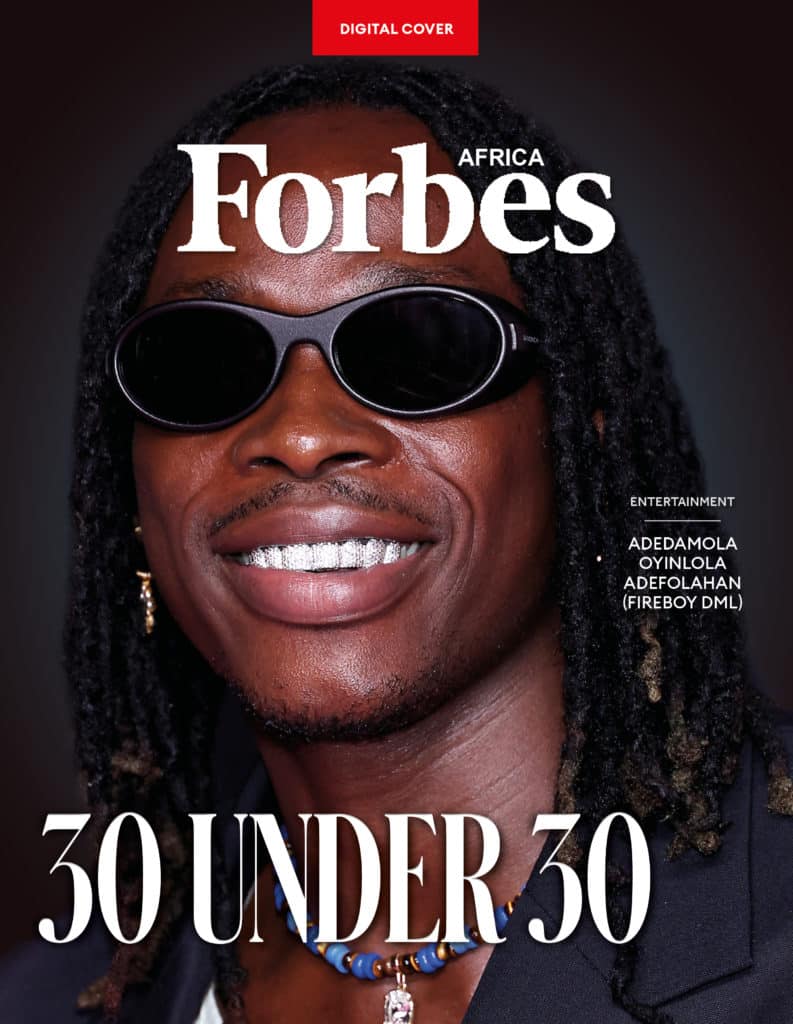
It was only when Adefolahan got to university and “started hanging out with the cool kids” that he fully immersed himself in music. He recalls how it was always a constant battle trying to manage his school work and pursue his passion, but ultimately his dreams won.
“A key milestone for me was when I was performing Peru with Ed Sheeran at the Wembley Stadium in London in front of 80,000 people. It didn’t really dawn on me until I was on that stage that I was singing with that man and 80,000 people were singing along, it was so unreal. I pride myself as someone who can keep himself together and control emotions.
But the moment I got to that stage, I burst into tears.”African music, specifically Afrobeats, has rapidly risen as one of the most popular genres globally. This is something Adefolahan is happy to be part of but wants to see more of from future artists.
“There’s so much amazing music coming from [Africa] right now, and seeing so much talent, it’s so exciting for me,” Adefolahan adds to FORBES AFRICA. “It just feels good to see young, exciting talent that sounds so fresh and so different from what I am used to… Africa is blessed, Afrobeats is blessed. We [have produced] five superstars every year now, like it’s become so normal. And it’s so beautiful to see and personally I want to be responsible for the next few generations of stars coming out.”
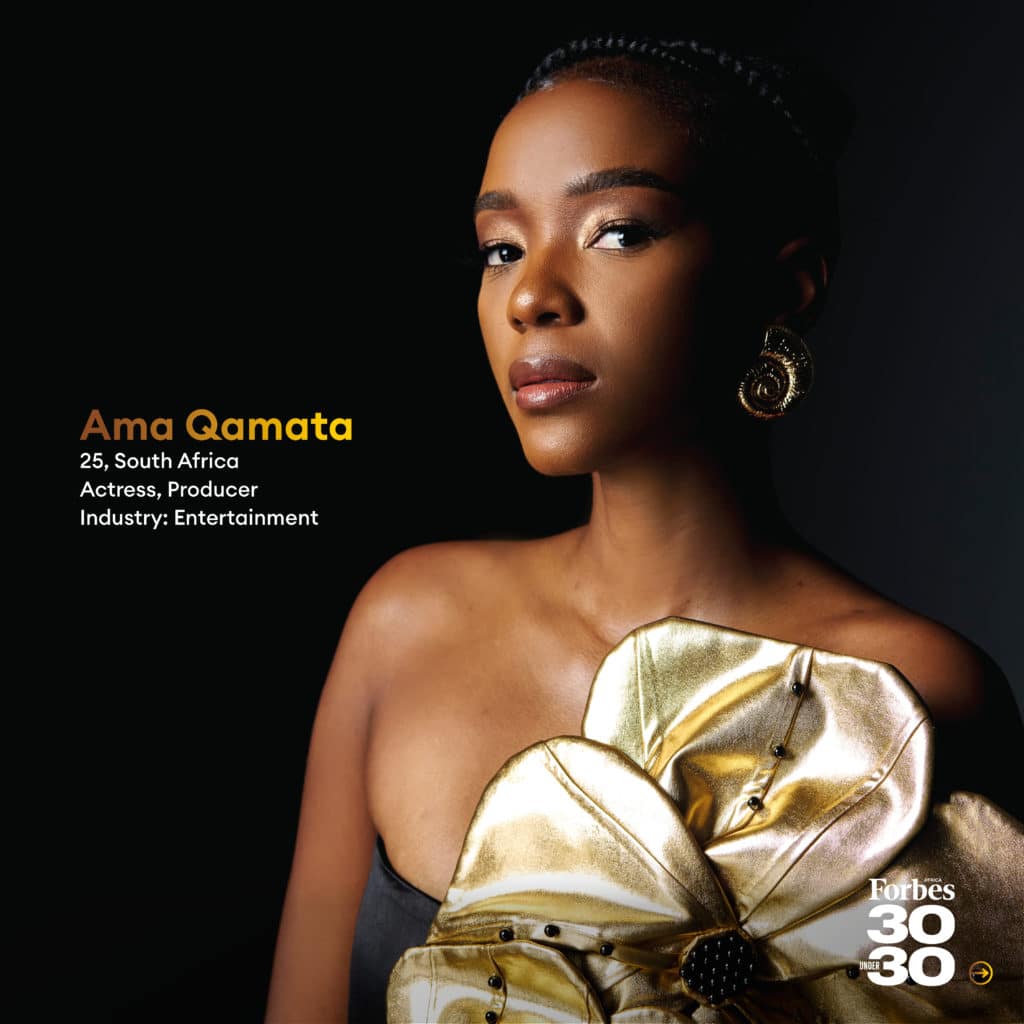
Known to the world as the actress who brought Puleng Khumalo to life in the Netfl ix original series Blood and Water, Ama Qamata describes this “passion project” as something she wanted to see do really well.
“I was in varsity, and dropped out in my second year,” Qamata says to FORBES AFRICA. “And I really was new to the industry. It was my fi rst time doing something that big. And I just remember the shooting being so stressful.
I guess my mentality the whole time was ‘I just need to show up and give my best’. I remember at the Queen Sono premiere, the CEO of Netfl ix, Ted Sarandos, met me and said, ‘oh, I’m not worried about the show’.”Sarandos was right. Months later, when the show premiered in May 2020, it ranked number one in South Africa, France, The Bahamas, Libya, Jamaica, Trinidad, and Kenya. It is also the fi rst South African show to reach number one in the United States.
“When it came out, it was insane. I didn’t even have time to process it because I was working,” Qamata laughs. In a 2023 report released by the streaming platform, Netflix stipulated that since entering key countries in sub-Saharan Africa, it has contributed across economic sector value chains within and adjacent to the cultural and creative industries and stakeholder ecosystems. It has contributed “directly” to job creation, skills development, and capacity-building in the local creative industry. “It’s about time. I think we have the most creative people in the world,” Qamata adds. “We have such beautiful stories, and what I love about our stories is that they are so raw… what we offer, the world has not seen yet.”

A ‘Sprint Queen’, Tobi Amusan recently won the women’s 100m hurdles Round 1 heat at the 13th Africa Games in Ghana.She also took the world by storm after clinching the gold medal in the 100m hurdles at the 2022 World Athletics Championships.
She is the current world record holder in the 100m hurdles, which has cemented her place as the first-ever Nigerian world champion and world record holder in an athletics event when she won the 2022 World Championships 100m hurdles gold medal, setting a world record.
“The goal was to come out and to win this gold,” said Amusan after breaking the world record. “I believe in my abilities, but I was not expecting a world record at these championships. You know, the goal is always just to execute well and get the win. So, the world record is a bonus.”

The co-founders of Omninela Medical, an e-commerce healthcare company, had one goal: to become a beacon of hope and change in South Africa’s medical landscape and beyond. The two brothers started with R10,000 ($530) and set out to address the pressing healthcare challenges faced by the public.
With their online platform, Ricardo and Nicolas conceived a solution to provide affordable, intelligent health devices and healthcare solutions to individuals and communities, recently expanding into markets across the continent.
“Having an idea of a possible solution was one box checked, but it took me seven months to develop a solution, tailor an offer, and find a market,” Nicolas says. “On a drive home, I spotted a large hospital on a hilltop and decided that if I didn’t make the bold move to at least introduce myself to someone in the supply chain management department of this hospital, I may miss an opportunity to find out if the market would accept the idea that my brother and I had created.”
After that initial introduction, Omninela had its first order. The platform serves as a lifeline for cancer patients, ensuring seamless access to medications without the burden of administrative complexities. “Woven into the fabric of our story is a profound sense of social impact — an account that extends beyond the confines of business metrics and profit margins,” Ricardo adds.
“It’s a narrative that unfolds as a lifeline for those engaged in battles that stretch far beyond the commercial realm, particularly the warriors in the fight against cancer.” Says Nicolas: “We want to make healthcare more accessible to as many South Africans and hopefully in the future… as many African countries as possible.”

At age 12 when Ayushi Chandaria was a member of the Kenyan junior national swim team, competing and traveling allowed her to witness the day-to-day challenges confronted by paraplegic swimmers. Thus began her lifelong mission to create meaningful opportunities and foster inclusivity within Kenya.
“[It] served as a wake-up call. It ignited a fervent desire to contribute to a solution, recognizing that the obstacles faced extended far beyond sports into realms of employment and financial struggles,” Chandaria says.
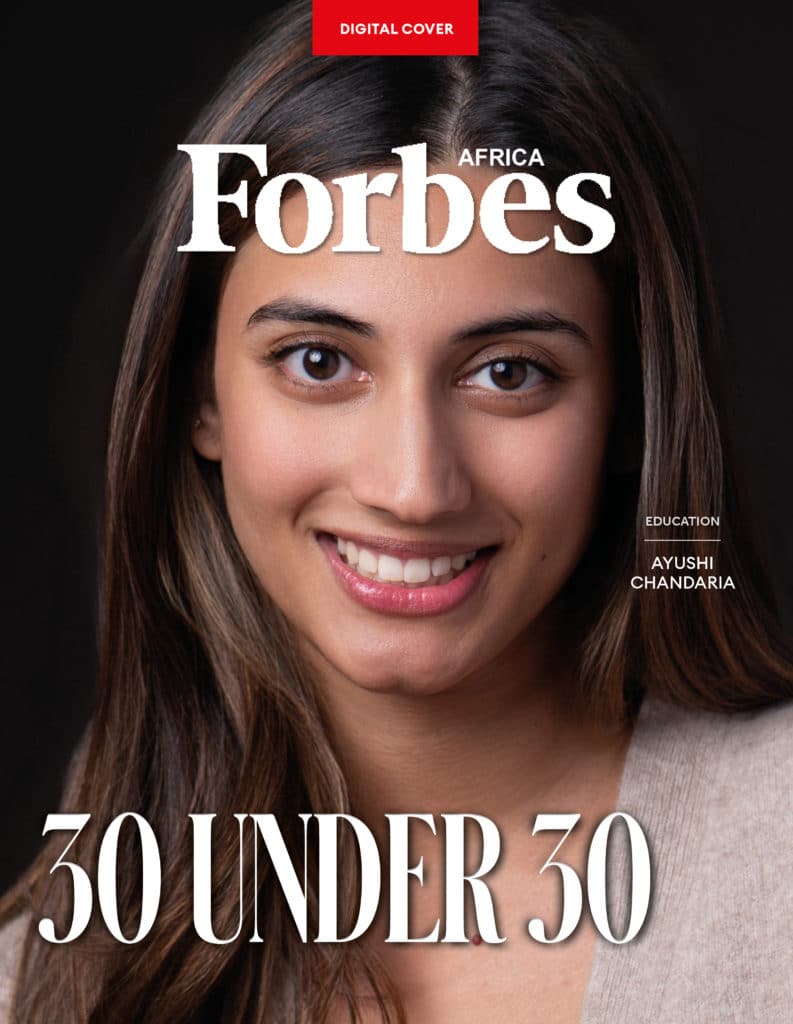
A few years later, she founded the Design Thinking Program in Kenya for high schools. Over the span of 10 weeks, the program engaged over 1,000 students across four high schools in Kenya, becoming a crucible for empowering young minds to identify and creatively address community challenges.
“It combined innovation and problem-solving, reflecting the commitment to fostering a generation of creative thinkers,” she explains. “The realization that high schoolers were struggling to find resources to continue their core education led to a tough decision.
The program shifted its focus to university students who possessed more experience and capability to make a difference in these trying times.
”The program has partnered with some of the biggest corporations in the world, such as Churchill, Google, SHOFCO, Safaricom, IDEO, and Dalberg Design, helping enrich and elevate its impact and reach. “The narrative of growth, resilience, and commitment is not just a story; it’s a living testament to the unwavering dedication to shaping a better future for Kenya and the African continent,” adds Chandaria.
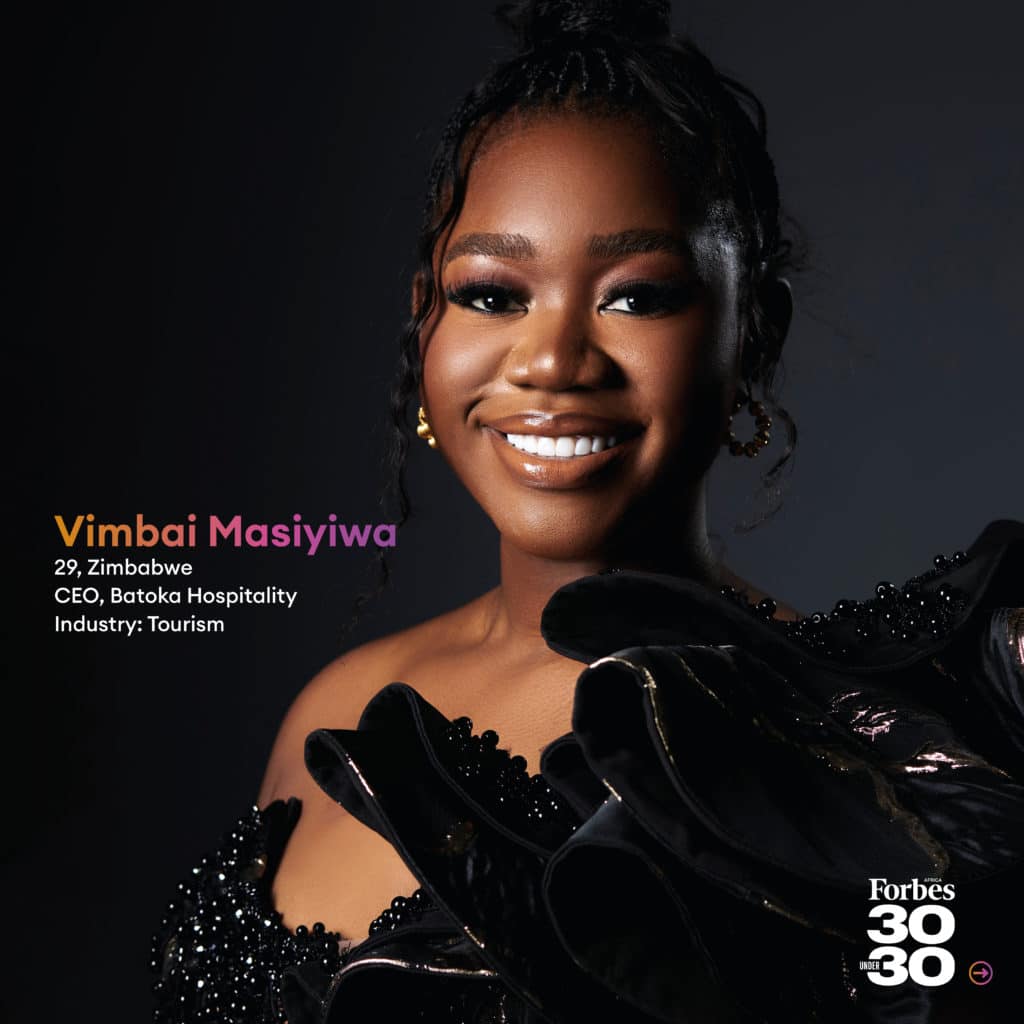
“Entrepreneurship is in my blood,” Vimbai Masiyiwa tells FORBES AFRICA. “I grew up watching my parents work hard to build their businesses, and I knew that it was something I intrinsically wanted to do.
”As the daughter of African billionaire Strive Masiyiwa (with a real time net worth of $1.9 billion as per Forbes on March 22, 2024) and Tsitsi Masiyiwa, she knew that there would be pressure on her to succeed. Diagnosed with cancer at “a pivotal stage” of her education made her reevaluate what she really wanted to do with her life and career.
“This moment catalyzed me to change direction with a focus on creating a meaningful business of my own,” says the cancer survivor today.Determination helped her launch Batoka Africa, which, for Masiyiwa, is the culmination of four years of ideating, fundraising, building and growing.
In 2019, she had the vision to turn Batoka into a successful social enterprise tourism business with an entirely new property component, which she spearheaded.Masiyiwa required a $4 million capital investment to build the property and while she could leverage existing staff and resources, a signifi cant component required fundraising.
From 2019 to 2021, it was one of her biggest challenges.“I am a believer in building great agile teams that have the ability to succeed, no matter the hurdles. Working with my incredible team on the ground and collaborators from all over the continent (with the majority of them being women) meant that we pulled together in the worst of times,” says the young Zimbabwean entrepreneur.

Soccor fanatics the world over have described Magaia as the player any coach would yearn to have in their starting lineup.
According to South African soccer manager and head coach of Banyana Banyana, also one of the judges for this list, Desiree Ellis, Magaia is called “the breadwinner” due to her knack for scoring crucial goals. “…and without the breadwinner, there’s no bread… so I had to provide the bread for the nation,” Magaia said in a 2023 post-match press conference.
In 2018, she won the National Sasol League play-off in her first season with TUT FC, and was named Diski Queen and Player of the Tournament. She has also been voted the Best Player at the 2020 Council of Southern Africa Football Associations (COSAFA) Women’s Championship tournament, earning herself a two-year deal with Swedish club Morön BK, scoring 12 goals in 22 matches.
Magaia is currently signed with Mexican league team, Mazatlan. She became the second South African to score two goals in the Continental Final (WAFCON) against Morocco for South Africa’s first title, and also claimed joint-top goal scorer. According to Ellis, Magaia was instrumental in helping South Africa beat Italy 3-2 by scoring her second goal and assisting with the winning goal to propel South Africa to the last 16 at the 2023 FIFA Women’s World Cup.
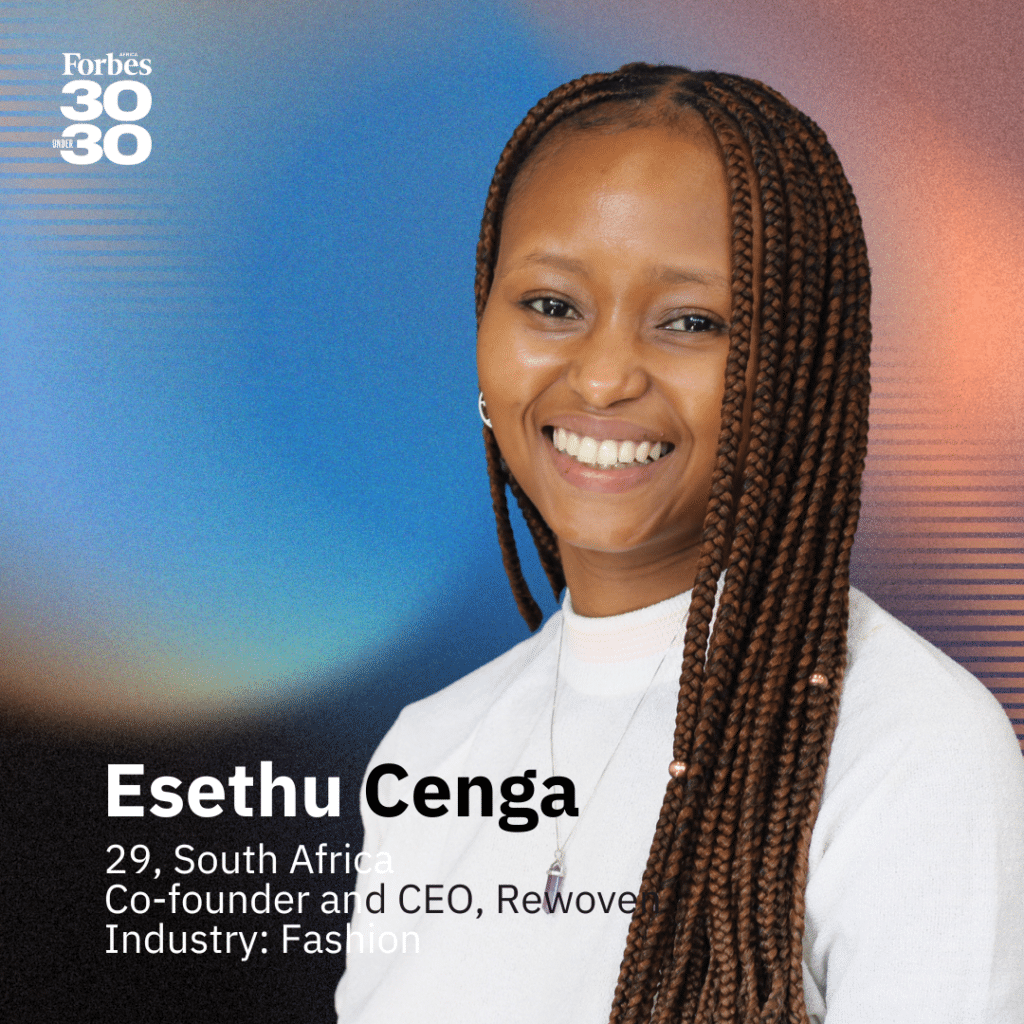
“I am a development economist by qualification, [so] a lot of how I see the world is informed by that perspective; a passion for understanding how we can create a world where everyone can live a life of dignity,” says Cenga.
“This passion drives me to be very interested in issues such as unemployment, inequality, and poverty in the Global South.”
The business began with Cenga’s love for fashion and textiles. For the 29-year-old entrepreneur, textiles and clothing are not just for aesthetics, which is how they have always been portrayed to her. “Textiles and apparel are an expression of who we are, an attempt to be connected (with ourselves and others) and an expression of something non- tangible.” Rewoven, a project aimed at bridging the gap between fashion and sustainability by diverting textile waste from landfills and creating a circular economy, was founded from Cenga’s realization that the fashion industry was the second-most polluting industry in the world, after the oil industry.
“Personally, as a fashion lover, decolonial scholar and development economist, this did not sit well with me. I could not resolve that cognitive dissonance of loving fashion but being aware of its real impact on my people and continent without becoming passionate about ethical fashion and circular fashion,” she says.
“I am not the first person to talk about textile recycling… But I’m definitely one of the people working hard to try and bring awareness to it, and, from an African perspective.”
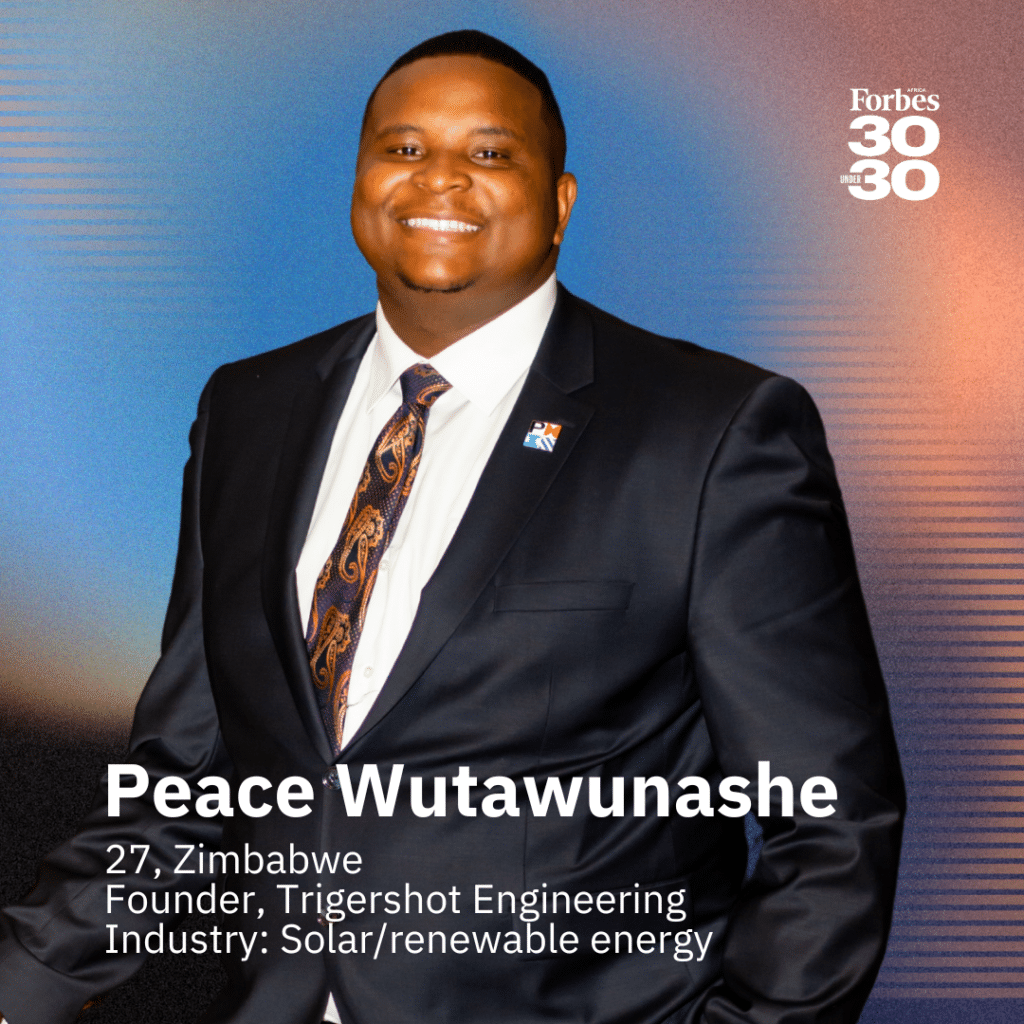
Having witnessed various energy crises growing up, including seeing rural communities struggle to access basic amenities like electricity and water, Wutawunashe sought to use his first-hand experience to solve these challenges.
“I challenged the status quo and bridged the gap by introducing environmental-friendly and affordable energy,” Wutawunashe says. “Solar energy’s potential has inspired me, so I embarked on a mission to bring affordable and reliable power to underserved regions, beginning in Masvingo (a city in southeastern Zimbabwe), my rural home.”
Trigershot Engineering specializes in civil/structural engineering, solar installation and construction. By harnessing solar energy, Wutawunashe has created a sustainable business that paves the way for a brighter future, not only for Zimbabwe but also for the rest of the continent.“I have brought light and hope to local communities while simultaneously addressing the urgent need for sustainable energy solutions.”
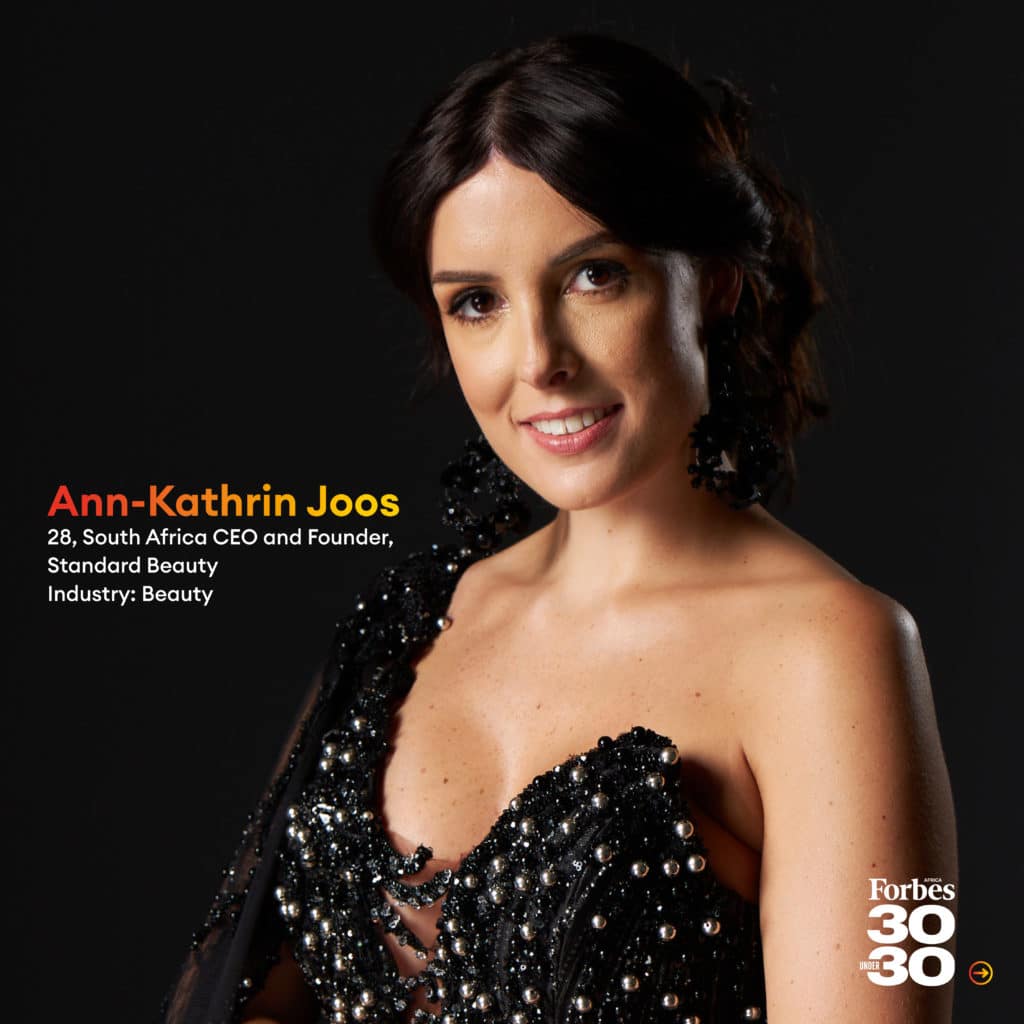
3The Covid-19 lockdown frustrated many businesses. Ann-Kathrin Joos, however, channeled her energy into tackling the lack of a ordable, inclusive and accessible makeup and skin care products in the South African market.In peak winter, with only R3,000 ($160) and the comfort of her kitchen at home, Joos founded Standard Beauty.
“I observed South African consumers’ preference for overseas brands, and sought to change this narrative, leveraging the country’s unique natural resources and addressing its unemployment crisis,” Joos says.
“My vision was to establish a brand ‘from South Africa, for South Africa’, prioritizing economic and social impact. I aimed to ensure that customer spending circulates within the local economy while also creating employment opportunities for women and supporting local suppliers to bolster various sectors.”
Fast forward to now and Standard Beauty has generated millions of rands in sales yearly and has grown into one of South Africa’s most spoken-about skincare brands.
“My journey embodies the spirit of youthful female entrepreneurship, resilience, and impact, and I’m proud to be a frontrunner in shaping the future of our industry,” Joos says. “With all my ambitions, I have this profound desire to create more employment opportunities for women across South Africa.”

What happens when you combine your love for fashion with a deep entrepreneurial drive… but then, you are currently studying biochemistry?This was James’s conundrum as she tried hard to figure out what her path would ultimately be.
“My mom is a tailor. I grew up thinking this is a poor man’s job, because of how much she used to charge, like peanuts…“
The most interesting fact about my career is that I never set out to be a fashion designer intentionally, because I believed there was no money in it. I was just exploring something I loved and found myself making money [with] it,” James, also known as Veekee James, tells FORBES AFRICA.
With $155, she decided to build the fashion brand that is Veekee James. Setting up a business in Nigeria is an absolute sport, James says. The economy and the policies are not in any way favorable to entrepreneurs, especially when building something by oneself, from scratch, without any help. But she persevered.
“I have come very far… because I had surpassed every possible dream I may have had. Now I dream some more every day and do all I can to encourage young people to dream better too,” she adds.

In February this year, Maswanganyi set a new South African record in the men’s 200m short track at an indoor track and field meet in Texas in the U.S.Considered one of the rising stars in sprint, the Soweto-born athlete has always been versatile in sport. In eighth grade alone, he played rugby, athletics and soccer, but Maswanganyi’s coach, at the time, encouraged him to pursue athletics as he believed that Maswanganyi was “going to be a star in this sport”.
According to Olympics.com, Maswanganyi is currently the season’s tenth-fastest man in the 100m from his 9.91 dashes and is the top-ranked South African after posting his first sub-20 seconds in the 200m. Maswanganyi tells FORBES AFRICA that just to be an Olympian “is one of the biggest milestones”, especially as it has allowed him to be a young pioneer in sport for Africans. “I’ve always aspired to inspire,” Maswanganyi says, adding, “I would not be where I am today without people inspiring me.
To show people that it doesn’t matter where you come from; I’m from Soweto, and there were not many people we could really look up to. But there were still good people in our communities that gave us hope and gave us inspiration to break the social norms, to break the social barriers, the stereotypes, and the stigmas. And it gave us hope that we could really shine and believe that there is a life outside of iKasi (township), like [for] a black child, it is possible.”

Social impact is at the core of Thoronka’s work. This view could have stemmed from the fact that he was born into adversity in a displacement camp when his country, Sierra Leone, was going through civil war (1991-2002).“The war left deep scars in its wake, not least of which was pervasive energy poverty and the unfolding realities of climate change [that] crippled the nation.”
The realization allowed him to start his career and look for energy solutions that could also address issues of education, health, and economic development. As such, Thoronka has received multiple notable awards for his commitment and innovative spirit in improving the lives of those in his community and across Africa. Some of his accolades include Most Innovative Energy Start-up 2020 by the United Nations Major Group for Children and Youth (UNMGCY) and the SDG7 Youth Constituency.
He was also honored as a laureate of the Commonwealth Youth Awards for Excellence in Development Work – Africa.
“My story is one of resilience, innovation, and the unwavering commitment of a mother to raise a son who has the potential to make the world a better place through sustainable energy and climate solutions,” says Thoronka, who continues to be inspired by his late mother, who raised him single-handedly.

With combined savings of $70,000, Calvin Usiri, one of three co-founders, launched Ramani in 2019. The company aims to address Africa’s supply chains, which, it stipulates, are broken.
“Inspired by the dedication of my parents – one a civil engineer and the other an epidemiologist working for the United Nations – I was ingrained with a deep-seated work ethic and vision to make meaningful impact,” Usiri tells FORBES AFRICA.
These supply chain challenges are due to a lack of data transparency and access to financial services. People then find that their product and financial needs are unmet, despite the fact that Africa’s consumer-packaged goods (CPGs) supply chain is worth $1 trillion, the company states.
Ramani has built an ecosystem of brands, micro-distribution centers and merchants, connecting them through its supply chain management software.
“Starting my company at the age of 22, I have led it through a period of remarkable growth and innovation. Over these years, we have invested over $150 million of capital into East Africa, creating substantial economic opportunities in the region,” Usiri says.

How does one go from working nine to five as a software engineer to becoming one of South Africa’s most-beloved social media influencers? Just ask Chad Jones. Known for his quirky dance videos with his parents, he gained popularity on social media during the Covid-19 pandemic.
Scrolling through Facebook one day, he saw TikTok videos on the platform. “I decided to download the app just to see what it was about. After a few hours of scrolling, all that popped up on my page were these short, catchy dances that looked fun. I created my account and asked my parents to join me for a [brief] dance,” he says.
Having convinced his parents to join in on his Gqom and Amapiano-style dances (even going as far as bribing his father with a PlayStation game in order to get him to participate), his family has become fan favorites.
“Now people ask where they are when I post videos,” Jones laughs. Almost four years later, Jones has forged his path as a content creator, and even has his parents on his payroll. “I pay them now. And they make a pretty decent amount of extra cash. Coming from [the] background I am from, it’s a wholesome feeling being able to do that for my family,” he says.

As a technology enthusiast, Akinloye is dedicated to leveraging cutting-edge innovations to address pressing societal challenges and improve the lives of people across Africa. “My work goes beyond mere profit-making; a deep commitment to social impact drives it,” Akinloye says.
Mainlogix Technology, with headquarters in Ontario, Canada, and operations extending to Lagos, Nigeria, aims to lead the charge in IoT and smart home technology.
“By developing solutions that enhance accessibility, safety, and independence for individuals facing challenges such as visual impairment or document loss, I feel like I am making a tangible difference in my community and beyond,” he adds.

“Fate ‘dumped’ me in the throes of computer education when my father thought I had become an academic embarrassment to the family because I couldn’t qualify [for] medical school,” says Oyetunji as he reflects on his journey to becoming an entrepreneur.
From an ‘unpopular major’ in Computer Science to multiple visits to internet cafes, Oyetunji bootstrapped his fintech company with only $1,000 in his pocket.
“My focus for establishing the fintech company is to solve the problem of offline cross-border money transfers in Africa. FXKudi has been recognized as [one of] the 50 early-stage, inclusive fintechs that aim to advance financial inclusion, by the International Finance Corporation in [2022].”
FXKudi was founded on simplifying and democratizing cross-border money transfers across Africa. It aims to ensure that sending and receiving money is simple, and allows people, businesses, and countries to connect easily.
“My story is one that lives in the realities of the lives of many young persons, especially in the harsh entrepreneurial environments of developing economies in Africa. However, it’s possible to make it. I celebrate the success.”

According to a 2021 Africa Early Childhood Network report, there are at least 200 children aged below four who were either born in prison or are still too young to be separated from mothers who are serving their prison sentences.
According to Sheikh, who is the founder of Beyond Kenyan Bars (BKB) and a dispute lawyer at law firm ALN Kenya, this is made worse as some of these children lack basic amenities and face the risk of malnutrition and disease.
Sheikh decided to run a pilot program in Murang’a Prison in Kenya, where she provided over 44,000 nutritious meals to 44 children over the past 14 months, promoting healthy development. “I couldn’t shake [off] an image from 2018, the time when I was volunteering with death row prisoners in Kenya, when I witnessed a mother breastfeeding a baby in a tiny, crowded cell,”Sheikh explains.
There are about 136 prisons in Kenya, 44 of these are women’s prisons, and in them, around 300 children, according to Sheikh. She started by feeding children in prison but hopes to expand to also providing educational facilities for them.
“I think I’m one of the very few people that [the Kenyan government] has [allowed] access to enter Kenya’s women’s prisons. [This means] I can continue to research to help the little ones there.
“I believe my work has the potential to create a ripple effect far beyond Kenya’s borders. Roughly half of the world’s countries allow children to live with their mothers for a few months or years. What distinguishes BKB is that, to the best of my knowledge, no other organization in the world looks after young children living in prisons the way that we do.”

This story starts with $6,000, small loans from parents, personal savings, unemployment benefi ts, and, among other things, the determination and vision to succeed as a tech startup.
“Our entrepreneurial journey began from the confi nes of our rented home, where my boyfriend burned the midnight oil coding software while I meticulously crafted our business plan. As we gained traction and attracted customers, we moved our operations to a shared office space provided by a friend,” Magori says.
Focusing on developing a Smart Electronic Fiscal Device (Smart EFD) solution, Magori looked to address pressing needs in the Tanzanian business landscape. The solution allowed business owners to issue tax invoices in compliance with Tanzanian laws and regulations, while offering a more effcient and cost-effective alternatives to the traditional, manual methods available in the market.
Part of the business is TenTen Explore, which, according to Tanzania daily Medium, is the country’s first digital travel marketplace that focuses on the domestic tourism scene and tells African history through different heritage sites found in Tanzania. “My journey from humble beginnings to a successful entrepreneur has been characterized by determination, resilience, and a commitment to making a positive impact,” Magori adds.
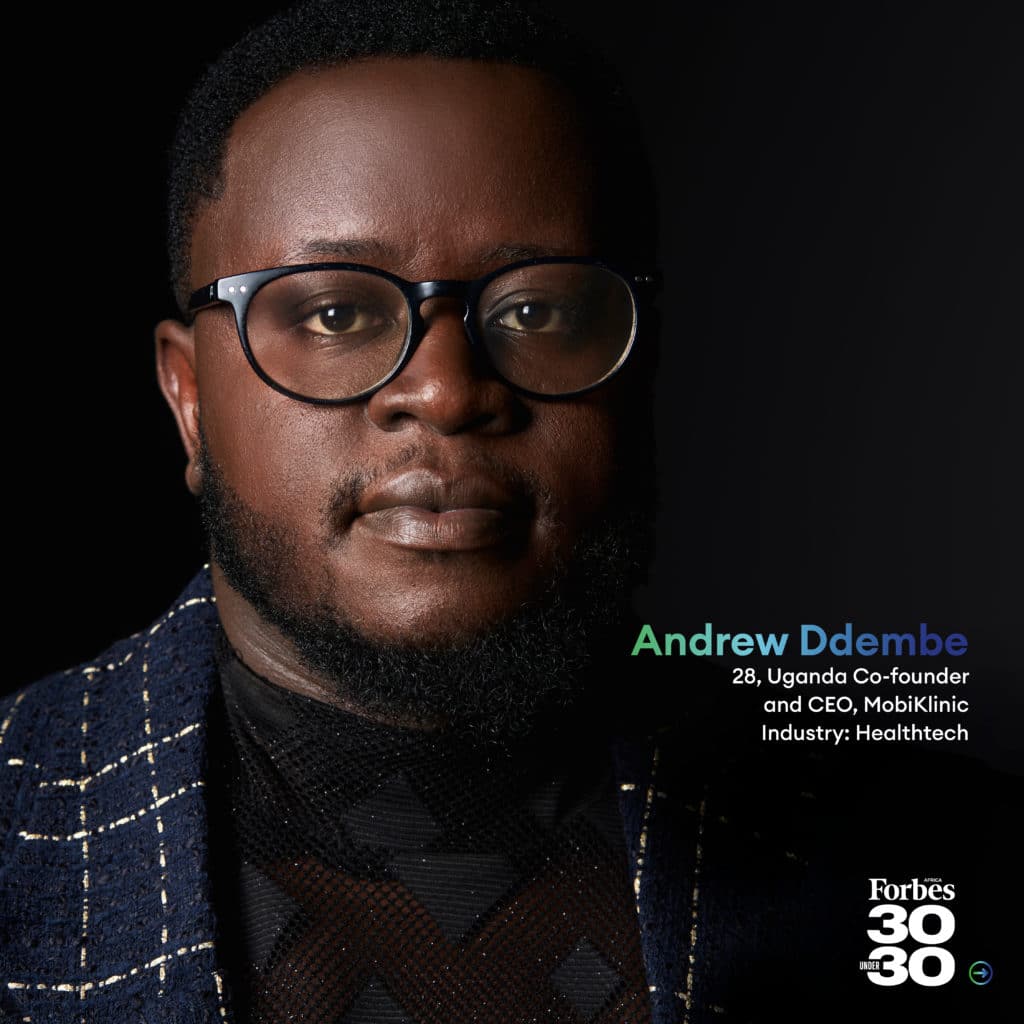
“I am very passionate about social justice and health equity. Like many entrepreneurs, my story began with a spark of frustration. I lost my grandmother due to the poor health system in rural areas,” Ddembe says.
When he traveled across sub-Saharan Africa (SSA) in 2018, Ddembe witnessed firsthand the stark disparities in access to healthcare. Rural communities, especially those in remote areas, often faced grueling journeys and exorbitant costs to receive basic medical attention. Reports have shown that Africa has some of the highest rates of disease in the world, especially in SSA and among children. The vast majority of mortality causes in this region are preventable.
“This injustice ignited a passion within me, a yearning to create a solution that would bridge the healthcare gap and bring vital services to those who needed them most,” Ddembe adds. MobiKlinic was thought up as a solution to empower communities by providing access to health services using technology.
The platform is designed to create digital tools for basic healthcare training, healthcare delivery and access to affordable healthcare services in Africa. Moreover, MobiKlinic strives to improve sexual and reproductive health through the provision of specialized services and knowledge.At the start of 2019, Ddembe’s idea won the Sandoz HACk, a global health access ideas challenge, and, with seed support of €20,000 ($21,800), he started developing the company that is now MobiKlinic, serving townships across Uganda.
“My story is a testament to the power of human compassion, innovation, and unwavering determination. It is a journey that continues to unfold, driven by the profound belief that healthcare is not a privilege, but a fundamental right for every human being.”

From venture capital (VC) to technology entrepreneurship; from a non-profit to for-profit… the unconventional start of this business began in 2021 for Mostert and his co-founder, Karl Nchite. They ideated and launched Young African Catalysts (CatalyzU) – a VC and startup ecosystem connecting and empowering Africa’s venture leaders. Mostert ran this parallel to his VC career.
The progress after just a year of operations at the beginning of 2023 is noteworthy, with reports of over 50 of Africa’s top VC funds represented and over 250 startup fundraising deals shared across 2022. “This progress was achieved with just $475 invested in the enterprise,” Mostert says.
“My journey in social projects and entrepreneurship began in my 20s and has grown yearly until I [have turned] 27. Achieving anything of substance always comes with barriers, and, in my life, those barriers have manifested acutely due to developmental complications and neurodiversity, which is still a challenge to manage to this day.”

About 15 years ago, Novitzkas embarked on what he calls “a life-changing and educational tour” of Silicon Valley, the California hub renowned worldwide for pioneering technology and fostering innovation. Having been surrounded by innovation, it left Novitzkas hungry to come back to South Africa with a drive to create technological solutions – on home ground.
“I came back to South Africa energized and inspired by the fact that ordinary, driven, young people could start billion-dollar companies, and they didn’t need money, experience, or a network to start; they just needed a problem to solve.”
Specno is the brainchild of Novitzkas and his co-founder, Jacques Jordaan, who validates, designs, and builds native mobile and web applications aimed at driving business growth.
“I am particularly proud of the fact that, through Specno, we have helped create around 300 jobs. That being said, my key motivator is the fact that the solutions we’ve built for our clients have been used to improve the lives of millions of people.”
Loading...
